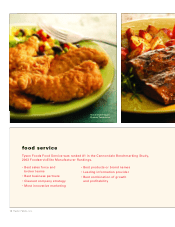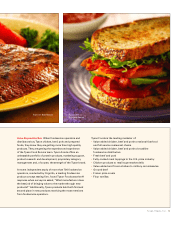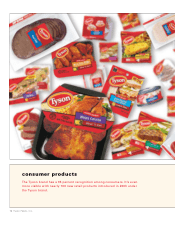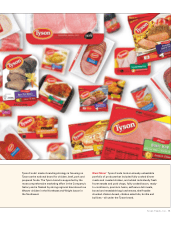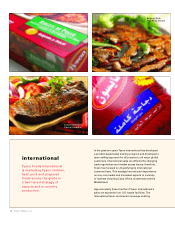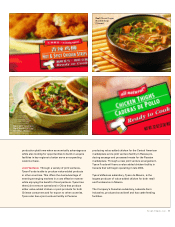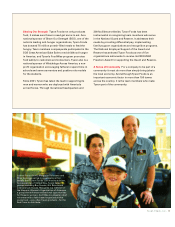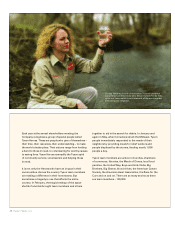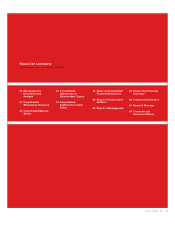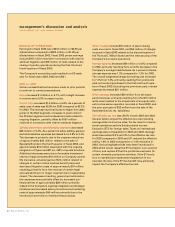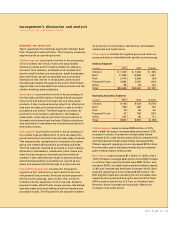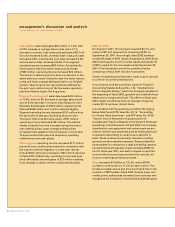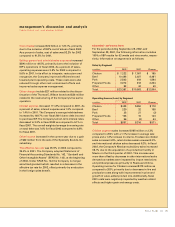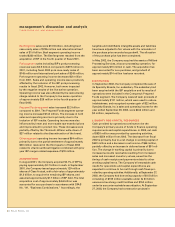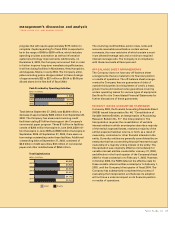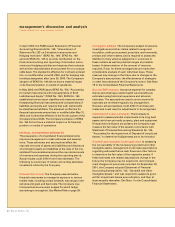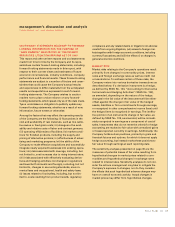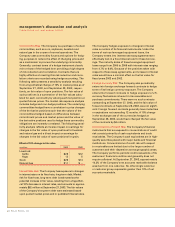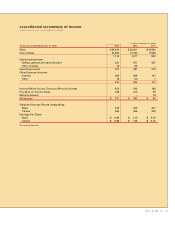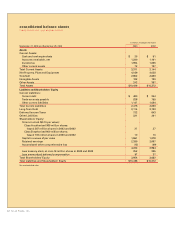Tyson Foods 2003 Annual Report Download - page 24
Download and view the complete annual report
Please find page 24 of the 2003 Tyson Foods annual report below. You can navigate through the pages in the report by either clicking on the pages listed below, or by using the keyword search tool below to find specific information within the annual report.
22 Tyson Foods, Inc.
management’s discussion and analysis
TYSON FOODS, INC. 2003 ANNUAL REPORT
RESULTS OF OPERATIONS
Earnings for fiscal 2003 were $337 million or $0.96 per
diluted share compared to $383 million or $1.08 per
diluted share in fiscal 2002. Fiscal 2003 pretax earnings
include $167 million received in connection with vitamin
antitrust litigation and $76 million of costs related to the
closing of poultry operations during the first, third and
fourth quarters of fiscal 2003.
The Company’s accounting cycle resulted in a 52-week
year for fiscal years 2003, 2002 and 2001.
2003 vs. 2002
Certain reclassifications have been made to prior periods
to conform to current presentations.
Sales increased $1.2 billion or 5.1%, with a slight increase
in volume and a 5.0% increase in price.
Cost of sales increased $1.3 billion or 5.8%. As a percent of
sales, cost of sales was 92.9% for 2003 compared to 92.2%
for 2002. This increase is primarily due to higher live cattle
prices in the Beef segment, increases in grain costs in
the Chicken segment and increased accruals related to
ongoing litigation, partially offset by $167 million
received in connection with vitamin antitrust litigation.
Selling, general and administrative expenses decreased
$46 million or 5.4%. As a percent of sales, selling, general
and administrative expenses decreased from 3.8% to 3.4%.
The decrease is primarily due to the expense reductions
of approximately $42 million related to the sale of
Specialty Brands in the fourth quarter of fiscal 2002, and
approximately $16 million associated with the ongoing
integration of Tyson and IBP, inc. (IBP) corporate functions.
Additional decreases were due to favorable investment
returns of approximately $18 million on Company owned
life insurance, actuarial gains of $13 million related to
changes in certain retiree medical benefit plans and
decreased litigation costs of approximately $19 million
resulting primarily from the reversal of certain legal
accruals which are no longer required due to cases being
closed. The decreases in selling, general and administra-
tive expenses were partially offset by increased pro-
fessional fees of approximately $26 million primarily
related to the Company’s ongoing integration and strategic
initiatives and increased sales promotions and marketing
costs of approximately $45 million primarily due to the
introduction and rollout of several new products.
Other charges include $76 million of plant closing
costs incurred in fiscal 2003, and $53 million of charges
incurred in fiscal 2002 related to the discontinuation of
the Thomas E. Wilson brand and the restructuring of the
Company’s live swine operations.
Interest expense decreased $9 million or 2.8% compared
to 2002, primarily resulting from an 8.2% decrease in the
Company’s average indebtedness. As a percent of sales,
interest expense was 1.2% compared to 1.3% for 2002.
The overall weighted average borrowing rate increased
to 7.4% from 7.0%, primarily resulting from premiums
paid on bonds repurchased in the first and fourth quar-
ters of fiscal 2003. Excluding the premiums paid, interest
expense decreased $21 million.
Other expense increased $29 million from the same
period last year, primarily resulting from the $10 million
write-down related to the impairment of an equity inter-
est in a live swine operation recorded in fiscal 2003, and
the prior year gain of $22 million from the sale of the
Specialty Brands, Inc. subsidiary.
The effective tax rate was 35.5% in both 2003 and 2002.
Several factors impact the effective tax rate including
average state income tax rates, the tax rates for interna-
tional operations and the Extraterritorial Income
Exclusion (ETI) for foreign sales. Taxes on international
earnings were comparable for 2003 and 2002. Average
state taxes added 2.2% and 3% to the effective tax rate
for 2003 compared to 2002 and ETI reduced the effective
rate by 1.9% in 2003 compared to a 1.4% reduction in
2002. Various legislative bills have been introduced in
2003 which would repeal the ETI exclusion over a period
of time, and replace ETI with a partial tax exclusion for
certain domestic production activities. If the ETI exclu-
sion is repealed and replacement legislation is not
enacted, the loss of the ETI tax benefit may adversely
impact the Company’s effective tax rate.


